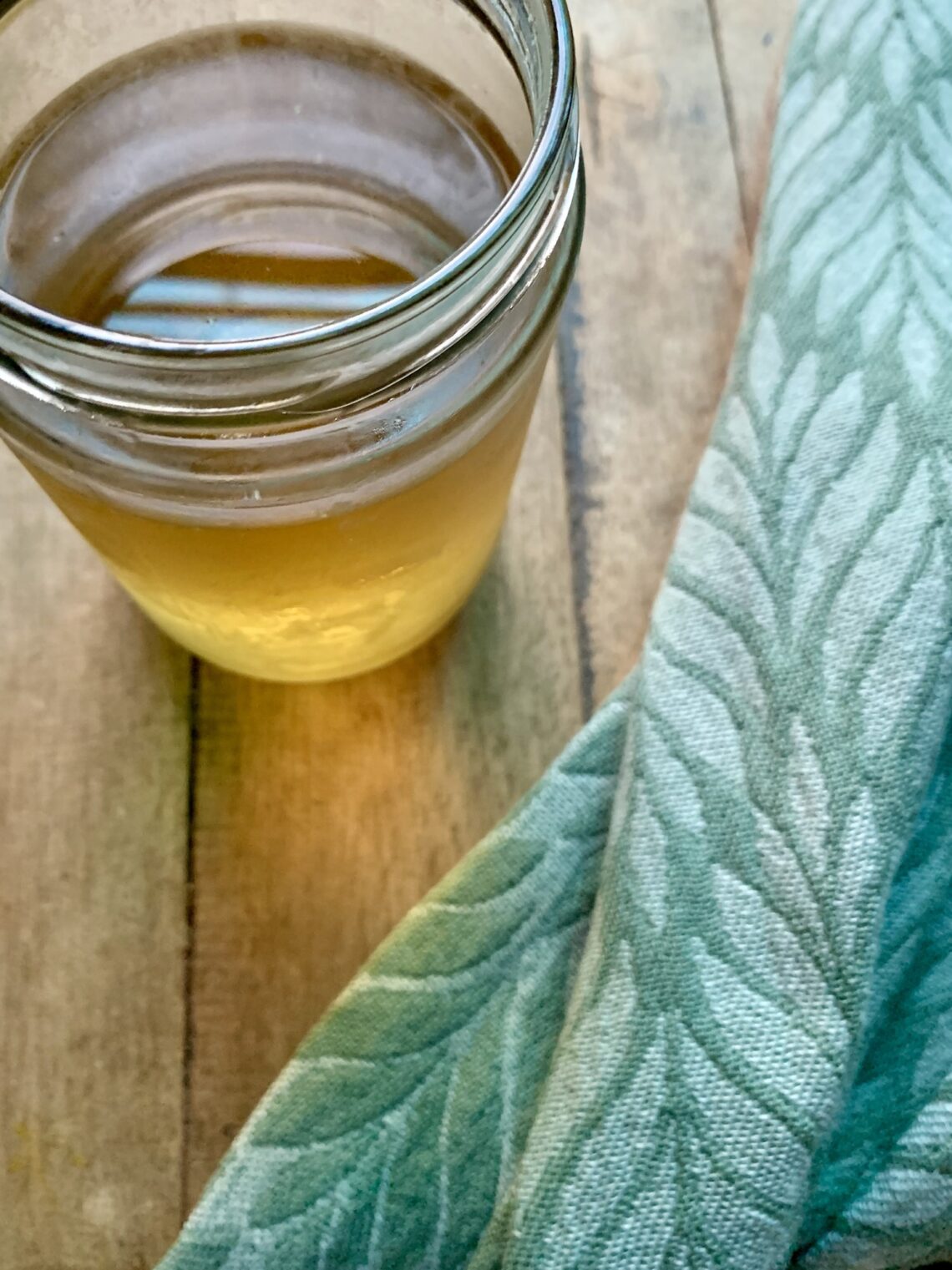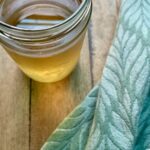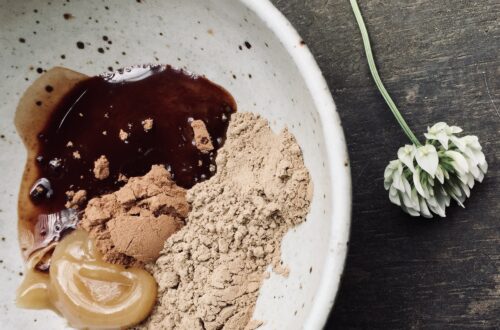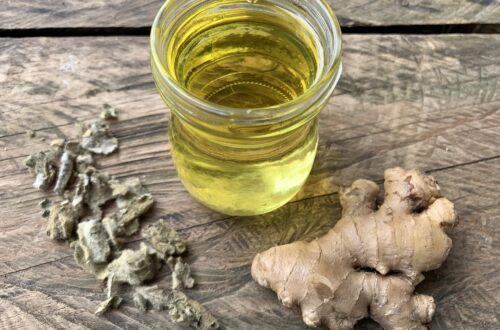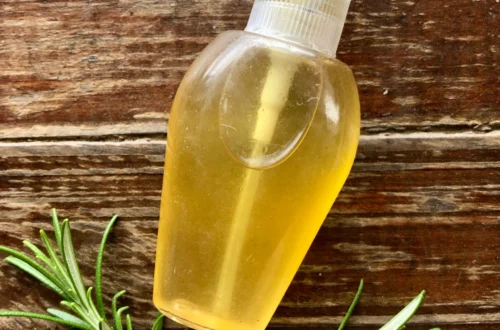While brushing and flossing are key to maintaining good oral health, a well-formulated mouthwash can offer extra support. Rinsing regularly helps reduce plaque, freshen breath, balance pH in the mouth, and soothe tender gums.
Conventional mouthwashes are often alcohol-based and contain synthetic colors and flavors that are detrimental to health and the environment. But, making your own non-toxic herbal mouthwash is a simple and beneficial alternative.
This recipe uses a water-based infusion of lemon balm and plantain, combined with sea salt and baking soda to promote overall oral wellness. Unlike tincture-based rinses, this version is alcohol-free, making it a gentler option.
Why Choose an Alcohol Free Mouthwash?
Many mouthwashes contain alcohol, which can cause dryness, irritation, and a burning sensation, especially for kids and anyone with sore gums. Because this recipe uses a water infusion (essentially just a strong tea) as it’s base instead of tinctures, it doesn’t contain any alcohol and is much gentler on sensitive mucus membranes.
Ingredients and Their Benefits
This herbal rinse is made with a few simple ingredients that offer specific benefits for oral health. Together, they create a gentle, effective mouthwash that doesn’t contain synthetic additives or harsh chemicals and is gentle enough for regular use, even for children.
Lemon Balm (Melissa officinalis)
Lemon balm is a potent addition to this herbal mouthwash due to its antiviral, antibacterial, and antioxidant properties. In oral care, lemon balm helps reduce unwanted bacteria that can contribute to cavities and infections and soothes inflamed tissues. It also has a fresh, lemony flavor that gives the rinse a pleasant taste and helps to freshen breath.
Plantain (Plantago major or P. lanceolata)
Plantain is a common weed found growing in many parts of the world that is often overlooked in lieu of showier herbs. Despite being undervalued, it’s a fantastic medicinal plant and is one that I reach for often. Its demulcent, astringent, and anti-
inflammatory properties make it well suited for soothing and toning the tissues of the mouth. Plantain is also antimicrobial, helping to keep unwanted bacteria in check. And it’s wound healing properties make it an excellent remedy for canker sores.
Sea Salt
Sea salt has a long history of use in oral care and is embraced by both traditional remedies and modern science alike. It’s known for its ability to gently cleanse the mouth, reduce inflammation, and support healing of oral tissue. In fact, one study found that saltwater rinses can be just as effective as chlorhexidine (a common medicated mouthwash) in reducing inflammation after periodontal surgery, making sea salt a simple, accessible option for supporting gum health (Gupta, Jain, & Singla, 2021).
Another study found that using a sea salt–based mouth rinse alongside regular brushing significantly reduced plaque and levels of Streptococcus mutans, a key bacteria involved in tooth decay, compared to rinsing with water alone (Mani, Mani, & Saini, 2018).
Baking Soda (Sodium Bicarbonate)
Baking soda is a natural ingredient that gently cleans teeth and balances the pH of your mouth. Research has found that rinsing with a baking soda solution significantly makes the mouth less acidic and thus, makes it harder for cavity-causing bacteria cavities to thrive. One study concluded that “Sodium Bicarbonate oral rinse may be considered as a cheap and effective alternative for chlorhexidine and alcohol based mouth wash, especially where long duration usage is required” (Chandel et al., 2017).
Shelf Life & Storage Tips
Because this mouthwash is made with all natural ingredients and is water-based, it has a fairly short shelf life. It’s best to make small batches, about a half cup at a time, and keep them refrigerated. For best results, use up each batch within around 3 days.
Adding about 1/2 tablespoon of vodka per batch is not necessary, but since alcohol is a preservative it can extend the shelf life a bit (to around 5-7 days). If you prefer to keep your mouthwash fully alcohol-free, you’ll need to make new batches every few days so that the rinse stays fresh and potent.
Making Alcohol-Free Herbal Mouthwash
Crafting your own herbal mouthwash at home is easy and doesn’t require any special equipment. With just a handful of ingredients, you can create an all-natural rinse to support oral health. Below you’ll find everything you need to get started, plus step-by-step instructions for making and using your homemade rinse.
What You’ll Need to Make Herbal Mouthwash:
- Filtered water
- Lemon balm leaves, fresh or dried
- Plantain leaves (Plantago major or P. lanceolata), fresh or dried
- Sea salt
- Baking soda
- Optional: vodka, to help extend shelf life
How to Make Herbal Mouthwash:
- Place the lemon balm and plantain leaves in a heatproof container or jar and pour boiling water over top.
- Cover and let steep until cooled to room temperature.
- Strain out the herbs using a fine mesh strainer or cheesecloth.
- Stir in the sea salt and baking soda until fully dissolved.
- If using vodka, add it now to improve shelf stability.
- Transfer the mouthwash to a clean glass bottle or jar with a lid. Store in the refrigerator and use within 3 days, or up to a week if you added vodka.
How to Use Herbal Mouthwash:
- Shake well before each use.
- Use about 1–2 tablespoons of mouthwash per rinse. Swish around your mouth for 30–60 seconds, then spit out. Avoid swallowing.
- Rinse 1–2 times daily, ideally after brushing your teeth.
Take Care of Your Mouth, Naturally
Making your own herbal mouthwash is a simple way to support your oral health without harsh chemicals. It’s great for calming irritated gums, freshening breath naturally, and supporting the overall health of your mouth, making it a gentle, effective addition to your daily routine.
Herbal Mouthwash (Alcohol Free)
Materials
Herbal Infusion
- 1/2 cup water
- 1 Tbsp lemon balm leaves, dried or 3 Tbsp fresh lemon balm leaves
- 1 Tbsp plantain leaves, dried or 3 Tbsp fresh plantain leaves
Mouthwash
- 1/4 tsp sea salt
- 1/4 tsp baking soda
Instructions
- Place the lemon balm and plantain leaves in a heatproof container or jar.
- Pour boiling water over the herbs and cover the container.
- Let the herbal infusion steep until cooled to room temperature.
- Strain out the herbs using a fine mesh strainer or cheesecloth.
- Stir in the sea salt and baking soda until fully dissolved.
- If using vodka, add it to the mixture.
- Pour the mouthwash into a clean glass bottle or jar with a lid.
- Store in the refrigerator and use within 3 days, or up to a week if you added vodka
References
Chandel, S., Khan, M. A., Singh, N., Agrawal, A., & Khare, V. (2017). The effect of sodium bicarbonate oral rinse on salivary pH and oral microflora: A prospective cohort study. National journal of maxillofacial surgery, 8(2), 106–109. https://doi.org/10.4103/njms.NJMS_36_17
Gupta, S., Jain, A., & Singla, M. (2021). Is saltwater mouth rinse as effective as chlorhexidine following periodontal surgery? Evidence-Based Dentistry, 22(4), 130–131. https://doi.org/10.1038/s41432-021-0227-6
Mani, A. M., Mani, S. A., & Saini, R. (2018). International Journal of Biomedical and Advance Research, 9(4), 167-170. https://doi.org/10.7439/ijbar.v9i4.4730
